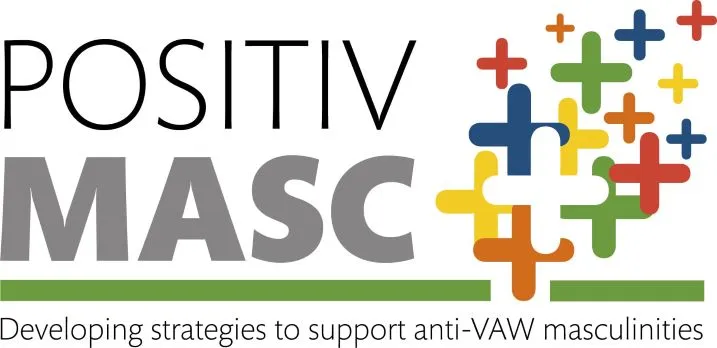The Positive Masc project
PositivMasc is a comparative research study (2019-2022), which seeks to explore how young people aged 18-24 understand and make sense of ideas about masculinity in relation to violence against women (VAW).

In spite of public policies and legislative changes aiming to curtail men’s violence against women (VAW) around the world, women continue to be exposed to violence throughout their life course. According to the 2015 European Union survey on VAW, one in three women in Europe have reported physical or sexual abuse from the age of 15 years.
Masculinities and men’s violence against women. What do we know?
Population-based studies in South Africa and multi-country studies in Latin America and Asia have consistently found that men who display hegemonic unequitable masculinities are more likely to perpetrate different forms of VAW. However, masculinities can manifest themselves in many different ways, and not always harmfully. Young men can enact different masculinities that express diverse discursive positions on gender equity and violence against women. Most promisingly, anti-VAW masculinities has previously been identified and exists among young men.
Rationale
It is widely recognized that traditional hegemonic forms of masculinities must be challenged and addressed if any reduction on VAW is to be achieved. The European Commission Advisory Committee on Equal Opportunities for Women and Men has also highlighted the relevance of identifying and supporting new forms of masculinities in tackling gender inequality. In Europe, a significant amount of research has been conducted on hegemonic masculinity and its connection with violence towards other men, intimate partner/honour-related violence, fatherhood, ill-health and increased young men´s risky sexual behaviours among others. These studies have provided important insights into the relationship between hegemonic masculinities, ill-health and different types of violence. However, none have specifically focused on young people, on interrogating the existence of masculinities which specifically challenge violence against women, and how these anti-VAW masculinities can be supported.
We are focusing on young people because of growing concern about rising rates of VAW perpetrated at younger ages and because they are at critical time when values and norms around VAW are forged. In addition, toxic partner relations can begin and endure if VAW is normalized at this age.
Thus, VAW prevention should start early in life if sustained progress on preventing VAW is to be achieved. We believe that identifying young people’s discursive positions on VAW, as well as the factors supporting anti-VAW masculinity discourses, are key steps in designing and implementing gender-sensitive, evidence-based policies aimed at challenging and reducing VAW and patriarchy.
Through its fieldwork, methodology, participatory process and dissemination strategies, the research will seek to contribute to public and policy debate and actions around anti-VAW masculine identities in addressing VAW. The four countries in this study, Sweden, Israel, Ireland and Spain, have been selected not just on the basis of their different prevalence rates of VAW, but also their diverse social, political and historical contexts. Adopting a transnational perspective will facilitate an exploration of how these diverse socio-cultural contexts – including laws, policies and welfare systems – shape young people’s understandings of masculinities and VAW within and across national borders.
Research design and methodology
Aims. The proposal aims are four-fold:
- to explore and position the discourses that young people (18-24 years, including men and women) in Sweden, Spain, Ireland and Israel use in their understanding of masculinities;
- to explore how these discourses influence young people’s attitudes, behaviours and responses to VAW,
- to explore individual and societal factors supporting and promoting anti-VAW masculinity discourses within and across these countries and
- to develop strategies and resources to support and promote anti-VAW masculinities in these settings.
Overall project design: In the first phase, data will be gathered using semi-structured interviews and focus groups discussions (FGDs), in order to identify the discourses that young people and stakeholders use to conceptualize masculinities and VAW and the strategies and actions needed to support and promote anti-VAW masculinities. Phase two will be built on the results of phase one and will consist of a concept mapping (CM) study. CM is a participatory research method that enables participants to visualize ideas about a topic of interest and develop solutions and strategies through engagement in structured study phases. Phase 3 of the project will seek to disseminate the findings of the CM exercise and engage community stakeholders in the design of guidelines and materials that promote and support anti-VAW masculinities.
Phase one. Qualitative data collection.
In each study country, data will be gathered through focus groups discussions (FGD) and interviews with young people stratified by gender. We will also recruit participants from organizations working to prevent VAW in each country. This will allow us to compare the similarities and differences between the discourses from both sets of participants. Results from the interviews and focus groups with young people will be as a starting point to discuss strategies to support anti-VAW masculinity discourses.
Phase two: Concept mapping.
A concept mapping participatory research method will be used in each country. Concept mapping is a mixed-method approach that enables groups of actors to visualize their ideas around an issue of mutual interest and develop common frameworks through a structured, participatory process. The steps are: (1) generation of ideas, (2) structuring of ideas through sorting and rating, (3) development of conceptual maps based on multivariate cluster statistical analysis, and finally collective interpretation of the maps. The research team will then gather all the proposed action/strategies for supporting and promoting anti-VAW masculinities and create a consolidated list.
Phase three: Presentation of findings and development of guidelines and materials that support and promote anti-VAW masculinities.
Phase 3 of the study will seek to disseminate the findings of the Concept Mapping exercise and engage community stakeholders in the design of guidelines and materials that promote and protect anti-VAW masculinities.
Policy Outputs: The outcomes of the research are relevant to a number of key policy areas within the four countries, including: health, education, justice, and children and youth affairs. PositivMasc will seek to inform the development of policy on the prevention of VAW by engaging in a dialogue with policy makers and practitioners working in these areas. Policy outputs will seek to inform specific regional/national strategies or initiatives.
Partners
PositivMasc is a collaboration between four universities in Spain, Sweden , Ireland and Israel.
- Department of Community Nursing, Preventive Medicine and Public Health and History of Science, University of Alicante, Alicante, Spain.
- Department of Global Public Health, GloSH research group, Karolinska Institutet, Stockholm, Sweden.
- Institute for Social Science in the 21st Century (ISS21)/ School of Applied Social Studies, University College Cork, Cork, Ireland.
- Department of Public Health, Faculty of Health Sciences, Ben-Gurion University of the Negev, Beer-Sheva, Israel.

Funding
This work has been supported by GENDER NET Plus Co-Fund (reference number 2018-00968). We also want to acknowledge the financial support received from the Swedish Research Council (Grant number: 2018-00968); the Irish Research Council; The Ministry of Science & Technology of Israel (3-15662) and the Ministry of Science and Innovation of Spain (Ref. PCI2019-103580).
Educational videos
The Positive Masc Project description
PositiveMasc Chapter 1. "I don't feel like sex"
PositiveMasc Chapter 2. "Don't be a pussy!"
PositiveMasc Chapter 3. "I love you too"
Publications
2024
Bolton, R., Leane, M., Ó Súilleabháin, F., Edwards, C., & Fennell, C. (2024). “Wherever There’s Men, it can Happen”: Constructions of Violence Against Women by Young Adults in Ireland. Violence Against Women, 30(5), 1175-1197. https://doi.org/10.1177/10778012221150273
2023
Cerdán-Torregrosa A, La Parra-Casado D, Vives-Cases C. "It is what we have been told to do": Masculinities and femininities crossing with sexual orientation and feminist activism in Spain. PLoS One. 2023 May 10;18(5):e0285544. doi: 10.1371/journal.pone.0285544. PMID: 37163542; PMCID: PMC10171591.
Cerdán-Torregrosa, A., Nardini, K., & Vives-Cases, C. (2023). “I Reject it, But That’s What Normally Happens”: Grey Zones of Gender-Based Violence and Gender Roles in Young People. Journal of Interpersonal Violence, 38(11-12), 7656-7677. https://doi.org/10.1177/08862605221147070
Daoud, N., Carmi, A., Bolton, R., Cerdán-Torregrosa, A., Nielsen, A., Alfayumi-Zeadna, S., Edwards, C., Ó Súilleabháin, F., Sanz-Barbero, B., Vives-Cases, C., & Salazar, M. (2023). Promoting Positive Masculinities to Address Violence Against Women: A Multicountry Concept Mapping Study. Journal of Interpersonal Violence, 38(9-10), 6523-6552. https://doi.org/10.1177/08862605221134641
Pérez-Martínez, V., Marcos-Marcos, J., Cerdán-Torregrosa, A., Briones-Vozmediano, E., Sanz-Barbero, B., Davó-Blanes, Mc., Daoud, N., Edwards, C., Salazar, M., La Parra-Casado, D., & Vives-Cases, C. (2023). Positive Masculinities and Gender-Based Violence Educational Interventions Among Young People: A Systematic Review. Trauma, Violence, & Abuse, 24(2), 468-486. https://doi.org/10.1177/15248380211030242
2022
Edwards, C., Bolton, R., Salazar, M., Vives-Cases, C., & Daoud, N. (2022). Young people’s constructions of gender norms and attitudes towards violence against women: a critical review of qualitative empirical literature. Journal of Gender Studies, 33(1), 100–111. https://doi.org/10.1080/09589236.2022.2119374
Cerdán-Torregrosa A, La Parra-Casado D, Vives-Cases C. “If You Do Not Fit in With the Stereotype, They Eat You Alive”: Discourses of Masculinities and Their Reflections in Young Spanish Men’s Health. Qualitative Health Research. 2022;32(2):225-237. doi:10.1177/10497323211050052
Bolton, R., Edwards, C., Leane, M., Ó Súilleabháin, F., & Fennell, C. (2022). ‘They’re you know, their audience’: How women are (ab)used to cement the heterosexual bonds between men. Irish Journal of Sociology, 30(1), 3-24. https://doi.org/10.1177/07916035211034355
2020
Salazar M, Daoud N, Edwards C, et al. PositivMasc: masculinities and violence against women among young people. Identifying discourses and developing strategies for change, a mixed-method study protocol. BMJ Open 2020;10:e038797. doi:10.1136/bmjopen-2020-038797
2020
Daoud, N., Sergienko, R., & Shoham-Vardi, I. (2020). Intimate Partner Violence Prevalence, Recurrence, Types, and Risk Factors Among Arab, and Jewish Immigrant and Nonimmigrant Women of Childbearing Age in Israel. Journal of Interpersonal Violence, 35(15-16), 2869-2896. https://doi.org/10.1177/0886260517705665
2019
Daoud N, Berger-Polsky A, Sergienko R, et al. Screening and receiving information for intimate partner violence in healthcare settings: a cross-sectional study of Arab and Jewish women of childbearing age in Israel. BMJ Open 2019;9:e022996. doi: 10.1136/bmjopen-2018-022996
2015
Salazar, M., & Öhman, A. (2015). Negotiating Masculinity, Violence, and Responsibility: A Situational Analysis of Young Nicaraguan Men’s Discourses on Intimate Partner and Sexual Violence. Journal of Aggression, Maltreatment & Trauma, 24(2), 131–149. https://doi.org/10.1080/10926771.2015.1002652
2016
Salazar, M., Goicolea, I., & Öhman, A. (2016). Respectable, Disreputable, or Rightful? Young Nicaraguan Women’s Discourses on Femininity, Intimate Partner Violence, and Sexual Abuse: A Grounded Theory Situational Analysis. Journal of Aggression, Maltreatment & Trauma, 25(3), 315–332. https://doi.org/10.1080/10926771.2015.1081662
2011
Carmen Vives-Cases, Maria Teresa Ruiz-Cantero, Vicenta Escribà-Agüir, Juan José Miralles, The effect of intimate partner violence and other forms of violence against women on health, Journal of Public Health, Volume 33, Issue 1, March 2011, Pages 15–21, https://doi.org/10.1093/pubmed/fdq101
2008
Diana Gil-González, Carmen Vives-Cases, María Teresa Ruiz, Mercedes Carrasco-Portiño, Carlos Álvarez-Dardet, Childhood experiences of violence in perpetrators as a risk factor of intimate partner violence: a systematic review, Journal of Public Health, Volume 30, Issue 1, March 2008, Pages 14–22, https://doi.org/10.1093/pubmed/fdm071
2022
Nardini, Krizia, et al. Educational intervention guide. Promoting positive masculinities for the prevention of violence against women. Conceptual toolbox and activities. Alicante: Carmen Vives Cases, 2022. ISBN 978-84-09-44502-8, 89 p. http://hdl.handle.net/10045/129346
PostivMasc conference presentations and videos 2022
Presentations
Videos
Working papers
Contact and partners
Principal investigators within the project

Mariano Salazar, Karolinska Institutet, Sweden
Mariano Salazar MD, MSC, Ph.D., is a mixed-methods researcher at the Department of Global Public Health, Karolinska Institutet, Sweden.
His research focuses on the interaction between gender, violence against women and sexual/reproductive health. He has collaborated with other researchers to study emergent social issues such as early teenage pregnancies, children´s resilience, and gendered constructions of stigma and discrimination to people living with HIV, among others. One of his goals has been to promote the use of gender and human right lens when designing and conducting research. To this end, he has implemented postgraduate training programs to foster the application of gender in all aspects of health/social research.
Contact:
Mariano Salazar, Karolinska Institutet, Department of Global Public Health , Tomtebodavägen 18 A, floor 3, 171 77 Stockholm, Sweden, mariano.salazar@ki.se

Claire Edwards, University College Cork, Ireland
Dr. Claire Edwards is Lecturer in Applied Social Studies and Director of the Institute for Social Science in the 21st Century (ISS21) at University College Cork.
Her background is in social policy and social and cultural geography. She has significant expertise of conducting research using qualitative research methodologies, and much of her work has focused around conducting research on disability and disabled people’s lives. She has published widely on this topic across the disciplines of social policy, geography, sociology and law. Most recently, her research has included violence, hostility and fear of crime as it is perceived and experienced by people with disabilities in Ireland, including gender-based and sexual violence. As Director of ISS21, she manages UCC’s Institute for Social Science in the 21st Century, an interdisciplinary social science research institute with over 100 members, and which hosts research around a number of thematic specialisms, including gender in/equality, and young people’s lives.
Contact:
Claire Edwards, University College Cork, Institute for Social Science in the 21st Century, Donovan’s Road, Cork, Ireland, claire.edwards@ucc.ie

Carmen Vives Cases, Universitad de Alicante, Spain
Carmen Vives-Cases, M.A., Ph.D., is professor at the Department of Community Nursing, Preventive Medicine and Public Health at the University of Alicante (UA) since 2001.
She is a sociologist (Bachelor 1998 and Doctor 2004) from the University of Alicante and Public Health Master (2005) from the University of Miguel Hernández. She has directed several research projects in the areas of epidemiology of gender-based violence against women (prevalence, incidence, health consequences, as well as their social determinants and evaluation of responses from the health sector) and immigration, ethnic minorities and public health. She is now coordinating the European Commission Action Grant, “Lights, Camera and Action against dating violence”, to promote violence-base protective assets among adolescents in Spain.
Contact:
Carmen Vives-Cases, Universidad de Alicante, Carretera San Vicente s/n, 03690 San Vicente del Raspeig, Alicante, Spain, carmen.vives@ua.es

Nihaya Daoud, Ben-Gurion University, Israel
Nihaya Daoud, M.A., Ph.D., is a social epidemiologist at the School of Public Health at Ben-Gurion University of the Negev in Israel.
She holds MPH and PhD from the Hebrew University in Jerusalem, and two post-doctorates at Ben-Gurion University of the Negev (BGU) and at the Center of Research on Inner City Health in Toronto, Canada. Currently she is the director of social epidemiology and health promotion track at the MPH. She is the director of the Ethics Review Board at the Faculty of Health Sciences, and the director of the Center for Research on Health Equity and Health Promotion. Her research interest includes women’s health, health inequalities, discrimination and social determinants of health among minorities and marginalized groups. In the area of violence against women, she has conducted research in Israel and internationally and published in high impact journals. Her recent research focuses on screening policy for intimate partner violence (IPV) at the health care system, use of health care services among women victims of IPV and the economic burden of IPV.
Contact:
Nihaya Daoud, Ben-Gurion University, Department of Public Health, P.O. Box 653, Beer Sheva, Israel 84015, daoud@bgu.ac.il
